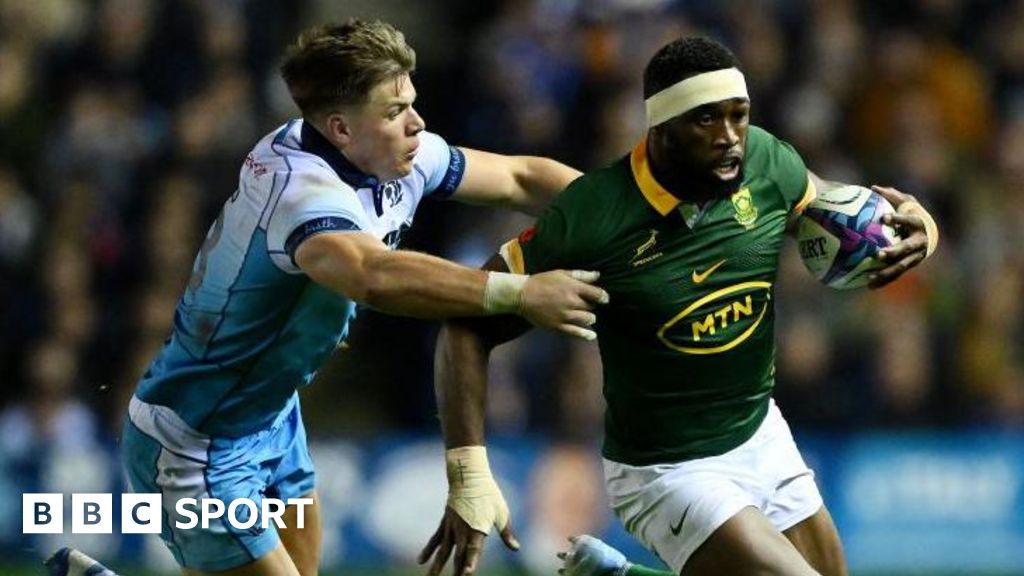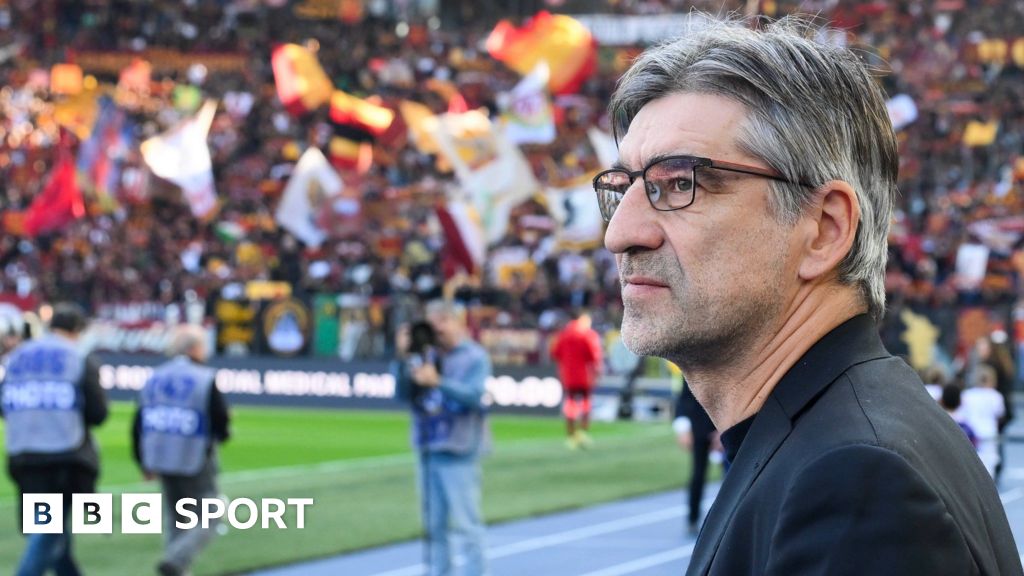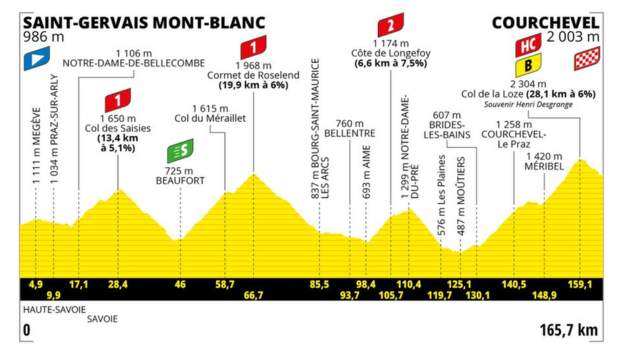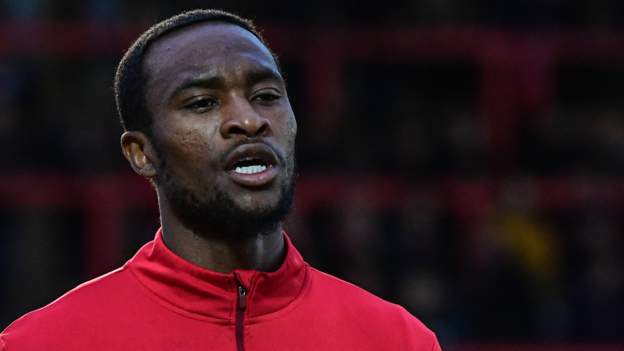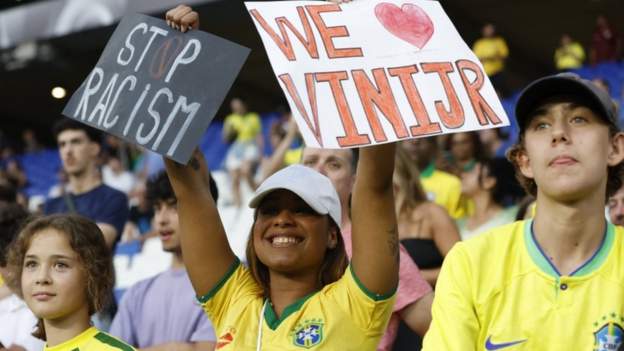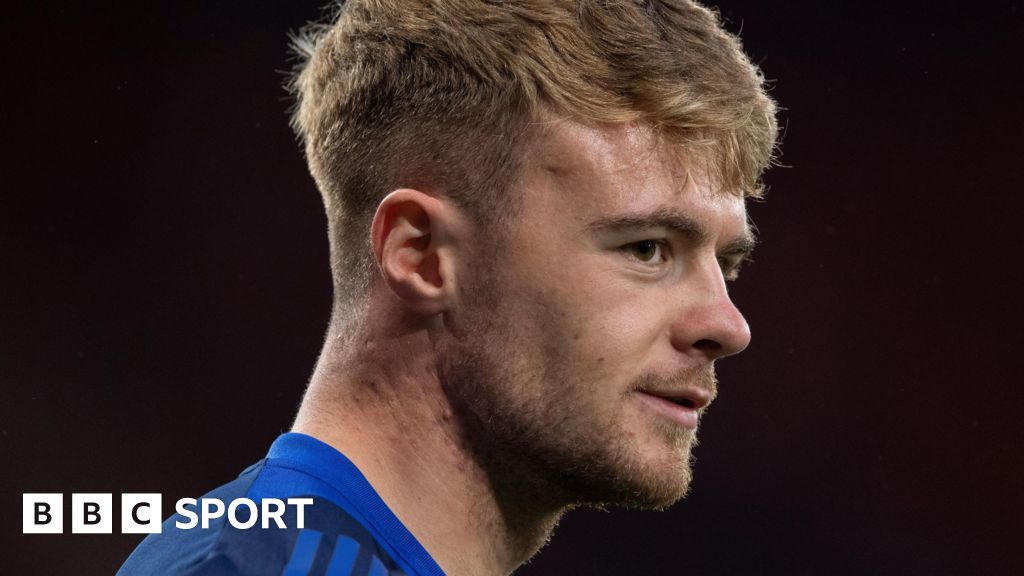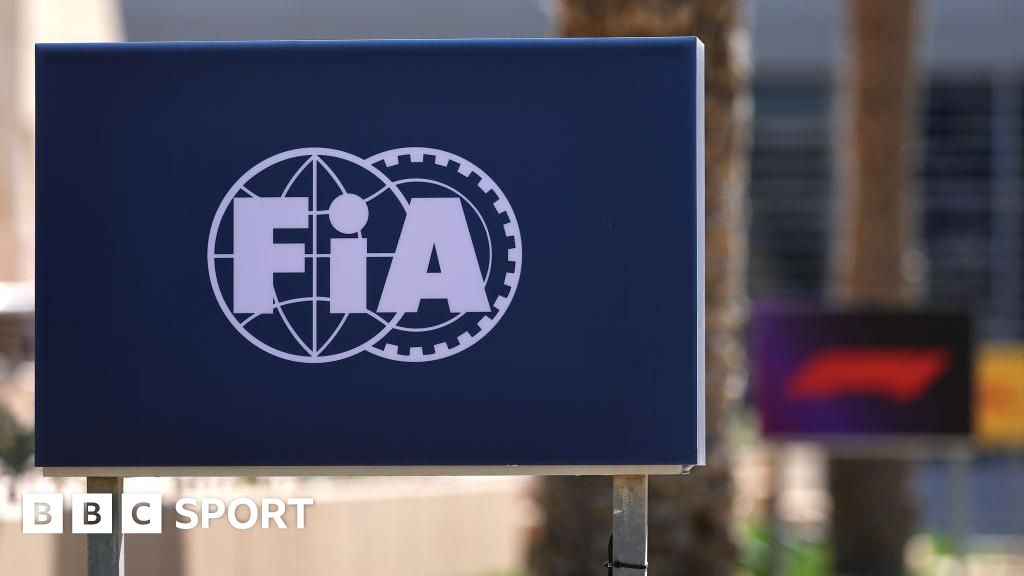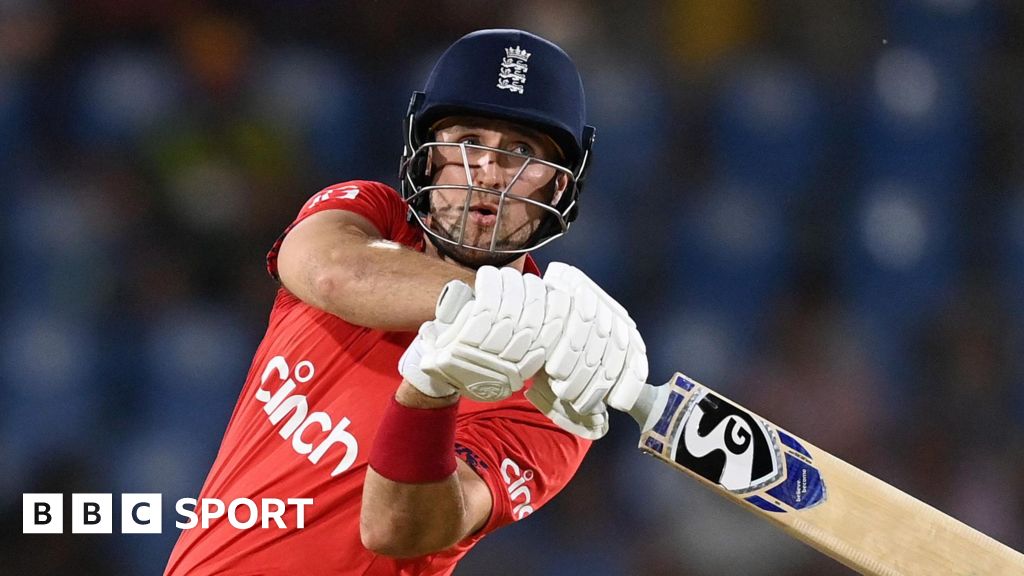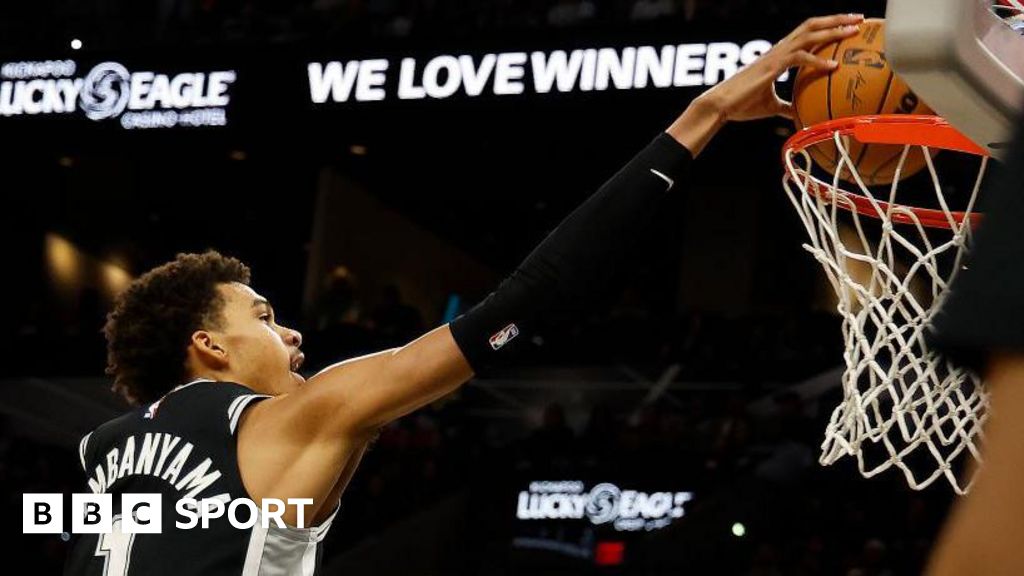| Dates: 1 July – 23 July |
| Coverage: Live text commentary on each stage on the BBC Sport website and app |
The 110th edition of the Tour de France gets under way in Bilbao, Spain on Saturday, 1 July and finishes in Paris on Sunday, 23 July.
The riders will tackle eight mountain stages and an individual time trial on trips to the Pyrenees and Alps during the 3,404km (2,115-mile) race.
BBC Sport looks at each stage of the gruelling three-week event, analysing where it could be won and lost.
This page will be updated throughout the Tour with the winner and a brief report following each stage.
Saturday, 1 July – stage one: Bilbao – Bilbao, 182km
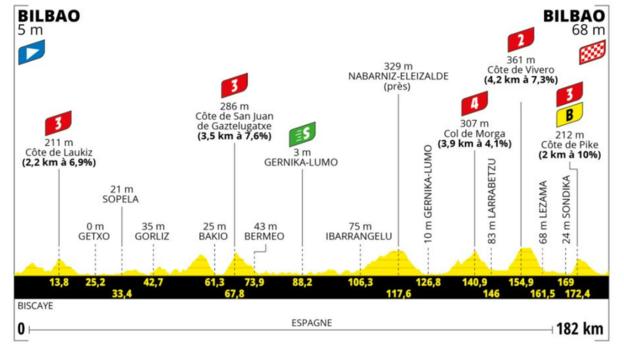
A tough, hilly day skirting around Bilbao gets this year’s Tour under way. The 182km route, which starts at the eye catching Guggenheim Museum, includes over 3,000 metres of vertical gain on a loop out to the Bay of Biscay coastline.
The spiky Pike Bidea climb, 10km from the city-centre finish, is one of five categorised climbs on a stage that is likely to favour the puncheurs – riders who enjoy short but steep climbs.
Riders to watch: Wout van Aert, Julian Alaphilippe, Tom Pidcock, Tadej Pogacar
Sunday, 2 July – stage two: Vitoria-Gasteiz to San Sebastian, 208.9km
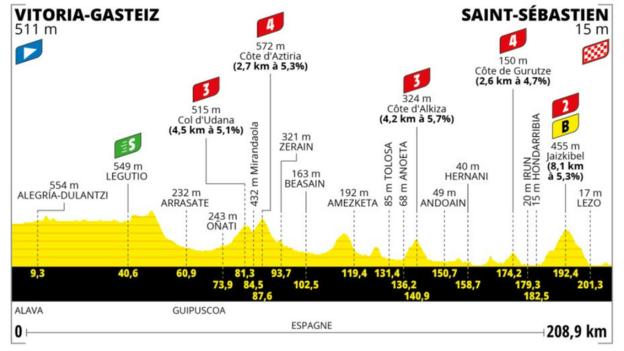
The longest stage of the Tour arrives on the second day along with five more categorised climbs.
The Jaizkibel climb, famous from the San Sebastian Classic, is just under 20km from the end and is likely to have a bearing on the outcome and possibly the early race lead.
Riders to watch: Wout van Aert, Biniam Girmay
Monday, 3 July – stage three: Amorebieta-Etxano – Bayonne, 187.4km
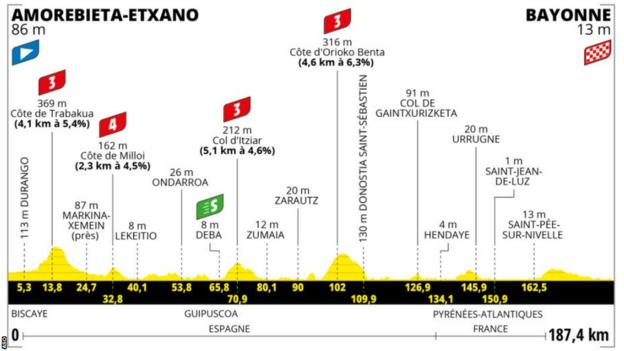
The Tour heads into France on a day when the sprint trains are expected to assemble for the first battle between the Tour’s fast men.
The early climbs are unlikely to place any stress on the peloton but the final gradient – the Cote de Saint-Pee-sur-Nivelle – could give the likes of Biniam Girmay, Mads Pedersen and Alexander Kristoff plenty of encouragement if the tempo upsets the pure sprinters before the road heads downhill towards the finish.
Riders to watch: Biniam Girmay, Mads Pedersen
Tuesday, 4 July – stage four: Dax – Nogaro, 181.8km
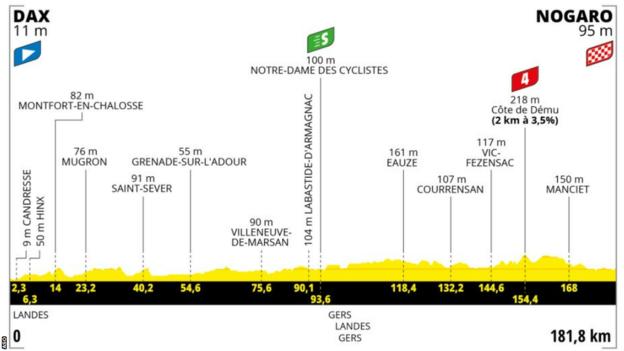
For a second day on the trot the sprinters will have something to get excited about.
A relatively flat route appears to guarantee a high-speed finish with the final three kilometres of the stage taking place on the Nogaro motor racing circuit, also known as the Circuit Paul Armagnac.
An 800m straight run to the line should see riders jostle for position and sparks fly – could this be the day for Mark Cavendish to break Eddy Merckx’s record for most stage wins?
Riders to watch: Jasper Philipsen, Fabio Jakobsen, Mark Cavendish, Dylan Groenewegen
Wednesday, 5 July – stage five: Pau – Laruns, 162.7km
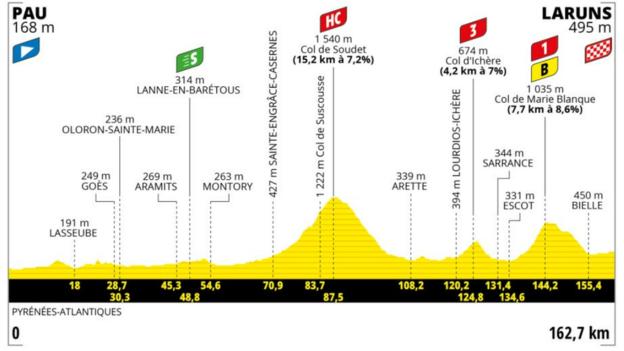
A trip into the Pyrenees comes early in this year’s Tour as Pau, a town in the foothills of the mountain range straddling the border of France and Spain, once again plays host to La Grande Boucle.
The first hors categorie climb, the energy sapping Col de Soudet, which is a 15.2km ascent at an average gradient of 7.2%, comes into view midway through the run to Laruns before the peloton hits the Col de Marie-Blanque, which ramps up to almost 14% in places.
While this stage will go down as a breakaway opportunity there will almost certainly be some early indicators towards the general classification battle.
Riders to watch: Matej Mohoric, Dylan Teuns, Magnus Cort
Thursday, 6 July – stage six: Tarbes – Cauterets, 144.9km
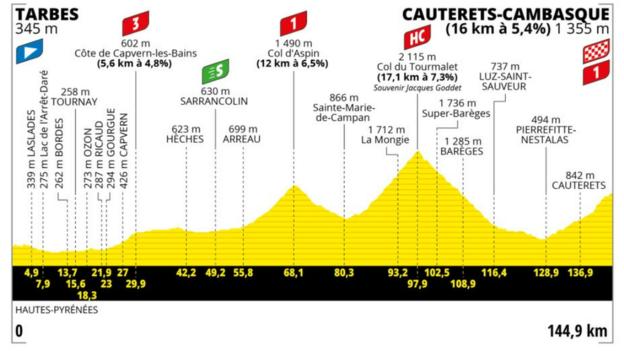
The general classification battle will almost certainly come into focus on the first summit finish in this year’s race.
The Col d’Aspin is followed by the iconic Col du Tourmalet, which takes riders 2,115m above sea level, and while there will be some respite on the long descent to follow, the final ascent into Cauterets could see the race illuminated by attacks in the last four kilometres when the double-digit gradients kick in.
Riders to watch: Tadej Pogacar, Tom Pidcock, Giulio Ciccone, Julian Alaphilippe, Wout van Aert
Friday, 7 July – stage seven: Mont-de-Marsan – Bordeaux, 169.9km
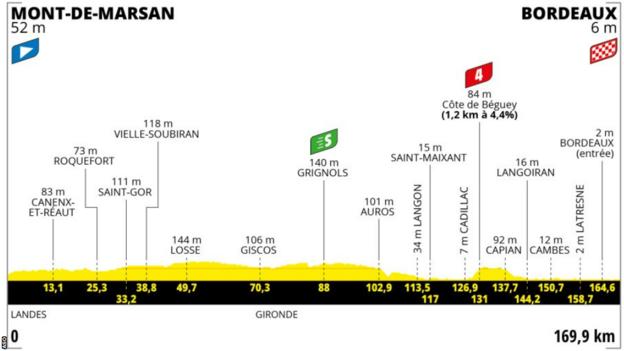
The Tour heads back to Bordeaux for the first time since 2010, with a sprint finish likely to be on the menu. The last winner in the hub of the famed wine-growing region was none other than a certain Mark Cavendish.
Could he repeat the feat some 13 years on? And if he hasn’t already, claim the outright record for stage victories in cycling’s greatest race?
Riders to watch: Jasper Philipsen, Fabio Jakobsen, Mark Cavendish, Wout van Aert,
Saturday, 8 July – stage eight: Libourne – Limoges, 200.7km
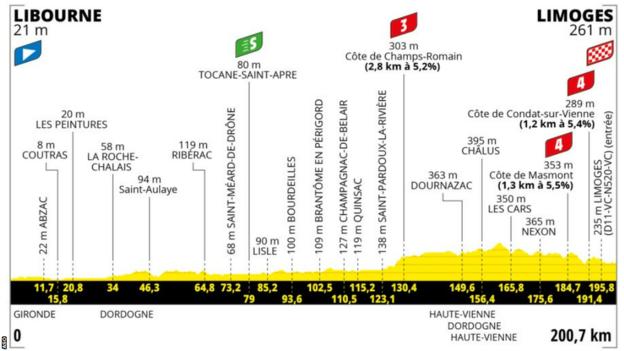
This transitional stage is only the second in this year’s race with a distance in excess of 200km.
While the parcours is relatively flat early on, the rolling terrain in the concluding 50km could make for an intriguing finale especially if those more at home in the one-day spring classics go all in for victory.
Riders to watch: Mathieu van der Poel, Dylan Van Baarle, Julian Alaphilippe, Wout van Aert
Sunday, 9 July – stage nine: Saint-Leonard-de-Noblat – Puy de Dome, 182.4km
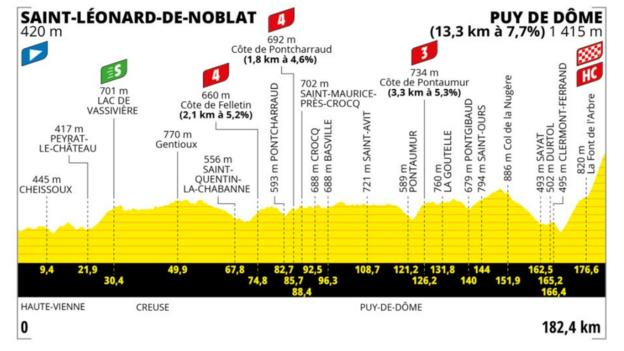
The Puy de Dome returns to the race for the first time since 1988, before the riders are granted a rest day.
The climb up the dormant volcano has delivered some extraordinary stories over the years including an epic duel between Raymond Poulidor and five-time winner Jacques Anquetil in 1964. It was also the scene of Eddy Merckx being punched by a fan as his hopes of a historic sixth Tour victory deteriorated in 1975.
With the final sections of the 13.3km climb punching up from about 7% to more than 12% gradients, a mouth watering battle between two-time winner Tadej Pogacar and the rider who dethroned him last year, Jonas Vingegaard, is eagerly anticipated.
Riders to watch: Tadej Pogacar, Jonas Vingegaard
Tuesday, 11 July – stage 10: Vulcania – Issoire, 162.7km
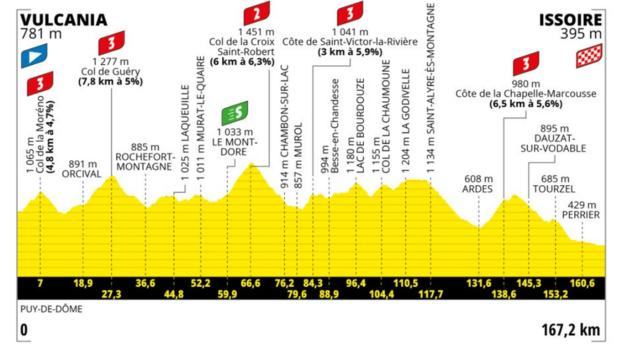
Arriving immediately after the first rest day, a stage containing five categorised climbs looks perfect for those looking to get in the early breakaway.
With sprinters unlikely to thrive on the lumpy terrain and the general classification riders having little to gain, the downhill finish to Issoire should also potentially favour any escapees.
Riders to watch: Magnus Cort, Omar Fraile, Fred Wright
Wednesday, 12 July – stage 11: Clermont-Ferrand – Moulins, 179.8km
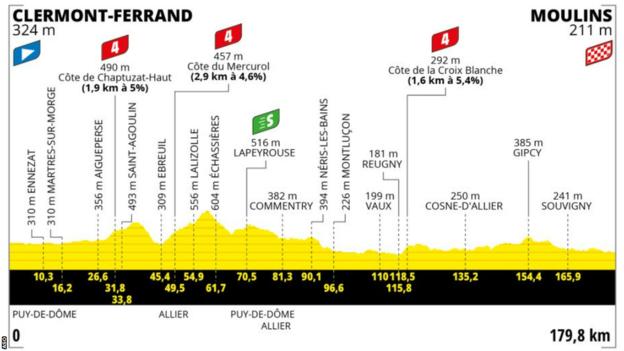
After a few tough days in the saddle this should be another stage for the sprinters who are unlikely to be troubled by three modest categorised climbs as the Tour heads to Moulins – in the heart of France – for the first time.
Riders to watch: Fabio Jakobsen, Dylan Groenewegen, Jasper Philipsen, Mark Cavendish
Thursday, 13 July – stage 12: Roanne – Belleville-en-Beaujolais, 168.8km
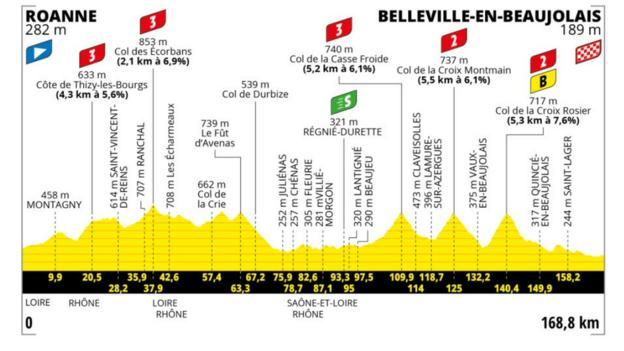
While Roanne is renowned for its extraordinary number of Michelin starred chefs, inspired primarily by the Troisgros family, and the wider Beaujolais region attracts wine lovers, stage 12 is unlikely to serve up a mouth-watering general classification battle.
Instead this should be another day when the baroudeurs – breakaway specialists – excel on the rolling hills between the Loire and the Rhone. The predominantly downhill final few kilometres should allow a small group of riders to hold off any late attempts by the peloton to reel them in.
Riders to watch: Neilson Powless, Mattias Skjelmose, Michal Kwiatkowski, Fred Wright
Friday, 14 July – stage 13: Chatillon-Sur-Chalaronne – Grand Colombier, 137.8km
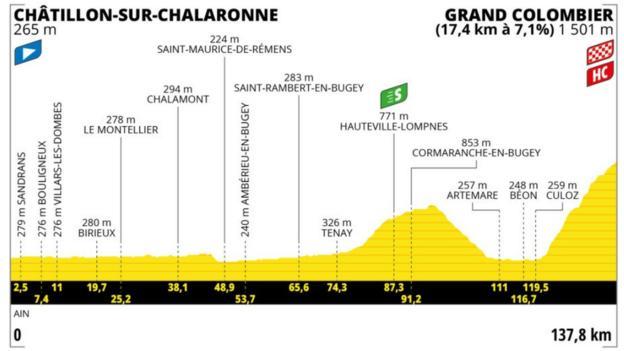
A short, brutal stage awaits on Bastille Day as the race enters the Jura mountains for a summit finish on the fearsome Grand Colombier.
Former champion Egan Bernal cracked here in 2020 as Tadej Pogacar claimed victory on the way to the first of his two Tour triumphs.
While a showdown between the Slovenian and defending champion Jonas Vingegaard is to be expected, Thibaut Pinot, in his final season as a professional, and several other French riders will aim to delight home crowds on their national holiday.
Riders to watch: Tadej Pogacar, Jonas Vingegaard, David Gaudu, Richard Carapaz, Thibaut Pinot
Saturday, 15 July – stage 14: Annemasse – Morzine Les Portes du Soleil, 137.8km
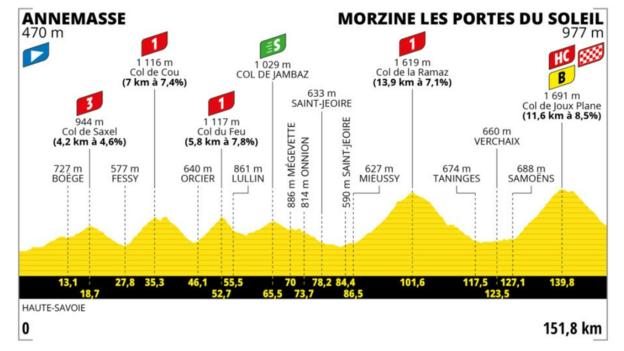
Three category one climbs up the Col de Cou, Col du Feu and Col de Ramaz feature on a hearty mountain stage during which the peloton is unlikely to spend too much time enjoying the views of Lake Geneva at the start of the stage, with about 4,200m of climbing ahead.
The Col de Joux Plane could see further fireworks in the race for the yellow jersey, albeit the high speed and technical descent to the finish in Morzine may also play a significant role.
Riders to watch: Tom Pidcock, Simon Yates, Matej Mohoric, Giulio Ciccone
Sunday, 16 July – stage 15: Les Gets les Portes du Soleil – Saint-Gervais Mont-Blanc, 179km
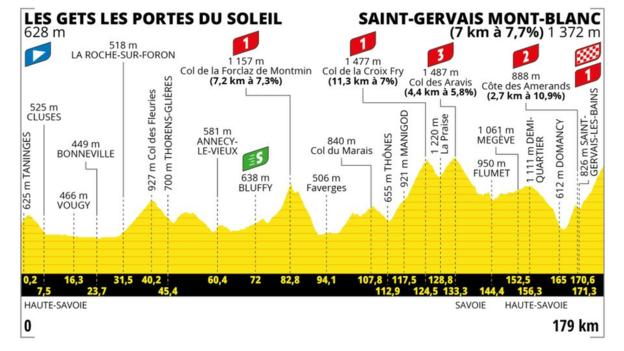
The Tour returns to the ski resort in the shadow of Mont Blanc seven years after its last visit, with more drama anticipated in the Alps.
Two category one climbs and two more minor ones are the prelude to an unforgiving ascent to the line where Romain Bardet won in 2016 to move second on the general classification behind Chris Froome.
Riders to watch: Jonas Vingegaard, Tadej Pogacar, Romain Bardet
Tuesday, 18 July – stage 16: Passy – Combloux, 22.4km
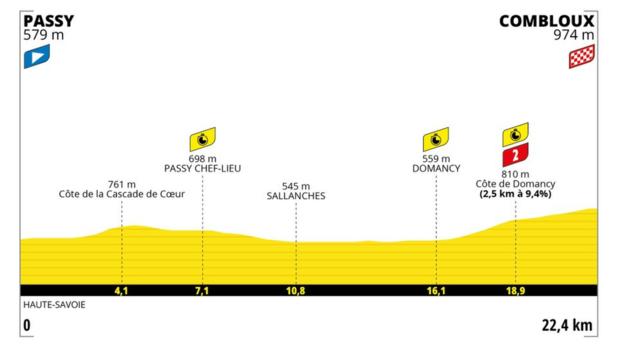
The only individual time trial of the Tour is hardly one for the purists in that discipline.
With the steep Cote de Domancy taking the route uphill towards the finish line, the course appears to favour the climbers and all-rounders who know how to push a big gear on the flatter sections in the valley.
Riders to watch: Wout van Aert, Tadej Pogacar, Jonas Vingegaard, Daniel Martinez, Mikkel Bjerg
Wednesday, 19 July – stage 17: Saint-Gervais Mont-Blanc – Courchevel,165.7km
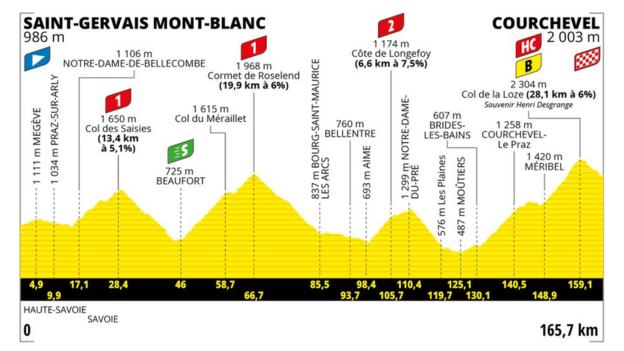
The race takes in more than 5,400m of climbing and hits its high point at an altitude of 2,304m on the Col de Loze.
The gruelling Alpine climb, with ramps of more than 20% on its most punishing section, has only featured once previously in the Tour when Miguel Angel Lopez put 15 seconds into Primoz Roglic and 30 into Tadej Pogacar in 2020.
From there a narrow route takes the riders towards the altiport at Courchevel, with the finish an 18% ramp, bearing a striking resemblance to the crawl to the line at Peyragudes on stage 17 last year.
Riders to watch: Tadej Pogacar, Jonas Vingegaard, Alexey Lutsenko, Ben O’Connor, Michael Woods
Thursday, 20 July – stage 18: Moutiers – Bourg-en-Bresse,184.9km
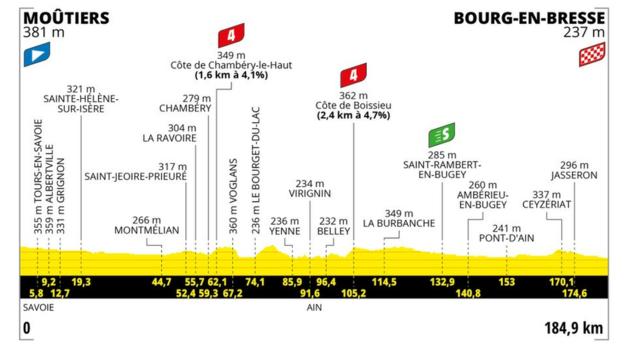
After seemingly being faced with an endless succession of mountains, the sprinters remaining in the race will eye this stage as one to showcase their talents.
Riders to watch: Fabio Jakobsen, Dylan Groenewegen, Jasper Philipsen, Mark Cavendish
Friday, 21 July – stage 19: Moirans-en-Montagne – Poligny, 172.8km
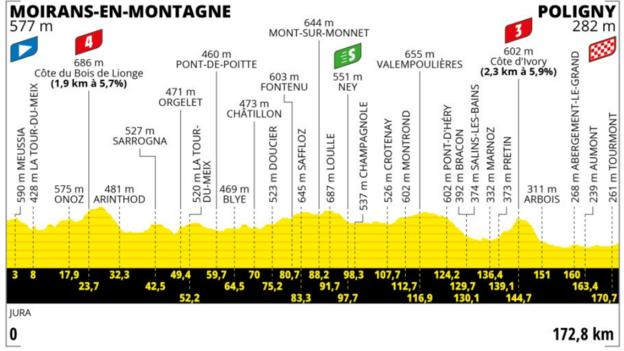
The peloton sweeps across the Jura Mountains without tackling any major climbs.
And with the final straight measuring more than eight kilometres in length, the fast men will be given a hefty lead out unless a breakaway has taken advantage of some tired legs in the peloton.
Riders to watch: Matej Mohoric, Kasper Asgreen, Stefan Kung, Fabio Jakobsen, Dylan Groenewegen, Mark Cavendish
Saturday, 22 July – stage 20: Belfort – Le Markstein Fellering 133.5km
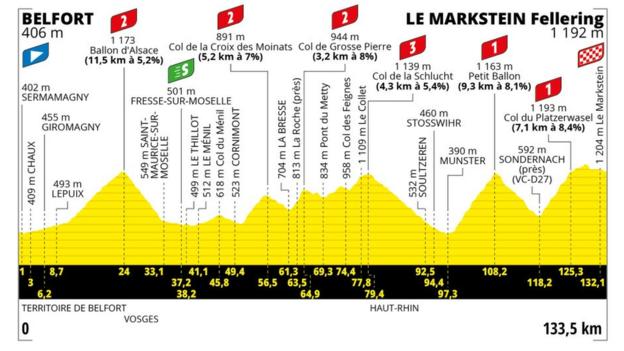
A short but demanding mountain stage which crams six categorised climbs into about 100km as the race dashes across the Vosges to the Le Markstein ski station.
This represents a last opportunity for those with yellow jersey ambitions and while none of the climbs would be classified as the most challenging in the race, the quick succession of ascents and descents could make for an intriguing finale.
Riders to watch: Egan Bernal, Richard Carapaz, Thibaut Pinot, Wout van Aert
Sunday, 23 July – stage 21: Saint-Quentin-en-Yvelines – Paris Champs-Elysees, 115.1km
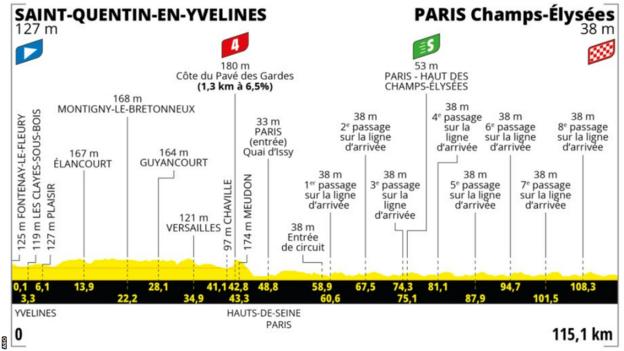
The Tour ends with its traditional processional final stage.
Expect to see the overall winner and his team-mates sip champagne and ride in leisurely fashion towards Paris, before eight frenetic laps on the Champs-Elysees circuit – which should see Mark Cavendish allowed some time off the front of the peloton to mark his achievements in his last Tour de France (should he make it to the end) – before a chaotic sprint finish on the cobbles.
Riders to watch: Fabio Jakobsen, Dylan Groenewegen, Jasper Philipsen, Mark Cavendish, Wout van Aert








